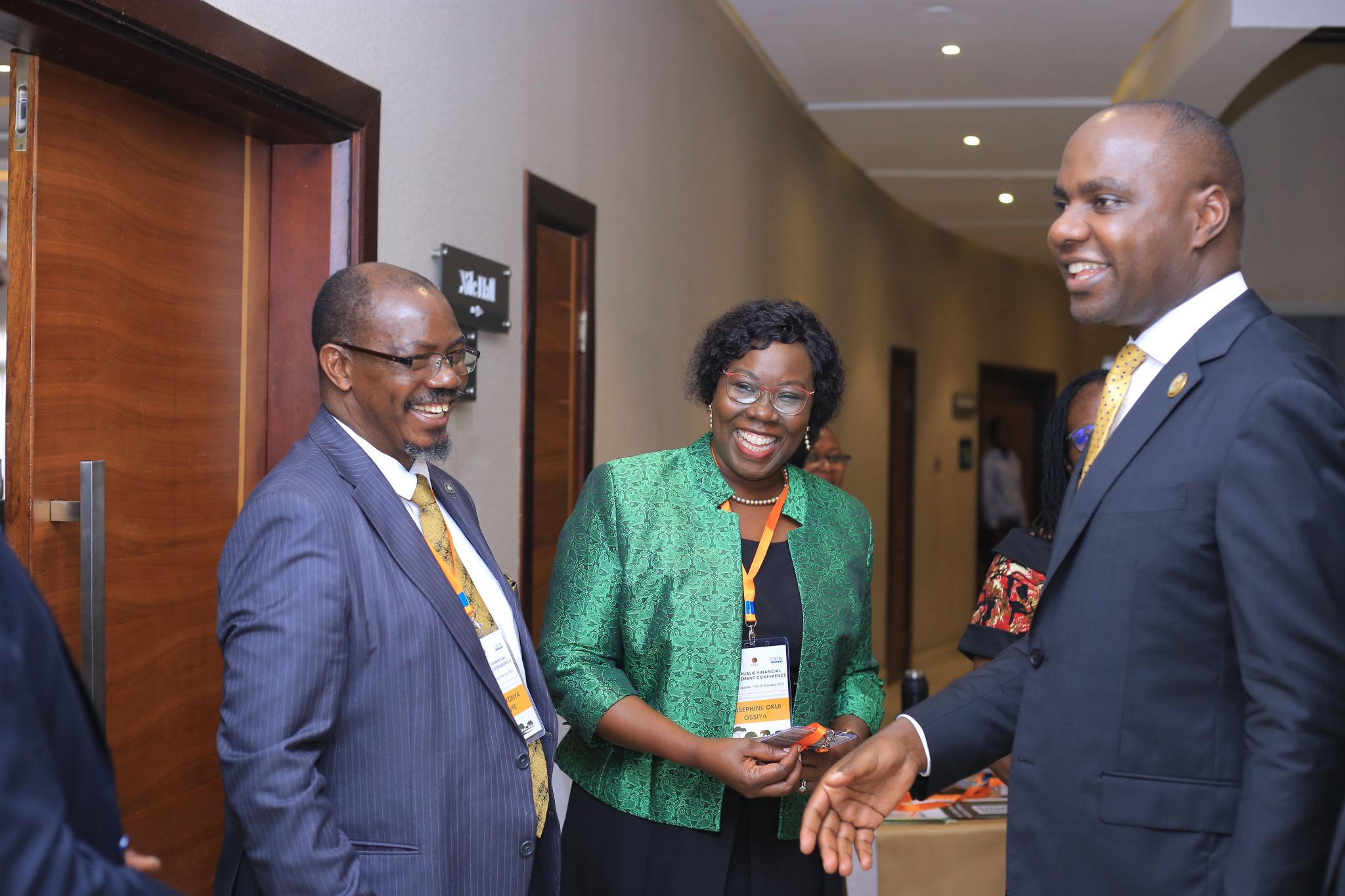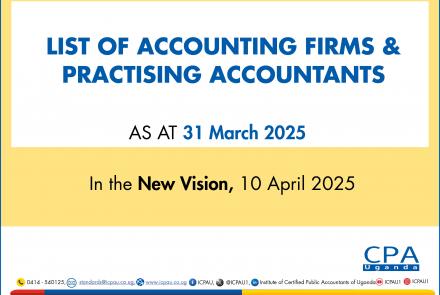By Caroline Nassuuna
Communications Officer, ICPAU
The Institute of Certified Public Accountants of Uganda (ICPAU) hosted the second edition of the Public Finance Management (PFM) Conference for Africa from 18 – 20 February 2025 at the Golden Tulip Canaan, Kampala.
Organised by the Pan African Federation of Accountants (PAFA) in collaboration with the African Union (AU) and ICPAU, the conference was a three-day event, featuring a two-day in-depth exploration of PFM and an International Public Sector Accounting Standards Board (IPSASB) roundtable.
The aim was to convene key stakeholders in the Africa PFM ecosystem from across the continent to evaluate progress in PFM reforms, share knowledge, and chart a path for enhancing PFM in Africa. These included high-level officials in the Africa PFM ecosystem including leaders of Professional Accountancy Organisations (PAOs), Accountant Generals, Auditor Generals, Members of Public Accounts Committees (PACs) and development partners.
"The event is of great significance as it is a crucial platform for advancing important discussions regarding Public Financial Management (PFM) reforms in Africa. These reforms are essential in improving efficiency, transparency and accountability in financial systems across the continent," said CPA Nkajja, Secretary/CEO of ICPAU.
The 2025 conference was based on the theme, Enhancing Public Finance in Africa: Progress and Prospects.
During the opening ceremony, the ICPAU President, CPA Josephine Ossiya noted that ICPAU, as the PAO for Uganda, is equally committed to furthering the continent’s PFM agenda through contributing to PFM policy development, building capacity for International Public Sector Accounting Standards (IPSAS) implementation in Uganda by supporting the activities of a public sector working group to implement accrual IPSAS in Uganda, and developing a PFM resource centre to increase awareness of the standards and simplify application.
She encouraged public sector accountants on the continent to take an interest in the development of IPSAS.
“I am honoured to take this opportunity to encourage our colleagues in the public sector to pick interest in the international public sector development process. Let us make the African voice loud enough, by offering input in the global standard setting process,” noted CPA Ossiya.
While delivering her opening address, CPA Keto Kayemba, the PAFA President noted that PAFA is deeply committed to strengthening PFM systems, as the continental body representing the accountancy profession, especially through capacity building, collaboration, and advocacy.
According to CPA Kayemba, PAFA’s 2025–2027 strategy, built on the pillars of Effective PAOs, Technical Excellence, and Quality & Mobility, aligns with Africa’s broader developmental objectives, including the African Union Agenda 2063 and the United Nations Sustainable Development Goals.
“As we engage in discussions over the next three days, I urge all of us—governments, regulators, legislators, professional accountants and development partners, among other actors to strengthen our collaboration in driving impactful reforms in PFM,” remarked CPA Kayemba.
The keynote speaker and State Minister for Finance, Planning and Economic Development, Hon. Henry Musasizi, noted that besides the significant challenges faced by Africa’s public finance systems, we cannot fail to acknowledge the notable steps that have been taken to manage and improve public finance management.
“We are strengthening legal frameworks, adopting digital solutions, improving revenue mobilisation and strengthening public debt management to improve public finance management, working towards sound public finance management, and paving way for a prosperous future,” remarked the Hon. Musasizi.
He further called upon the key public finance management players to commit themselves to reforms that will make public finance systems more resilient, transparent and inclusive to unlock the continent’s vast potential.
Building on the success of the first PFM Conference for Africa held in Kenya in 2024, the 2025 conference was envisaged to contribute to improved public service delivery and sustainable economic growth across Africa by noting significant milestones, exploring recent advancements and identifying emerging opportunities for enhancing transparency, accountability, and efficiency in PFM.
The conference had a number of resource persons in attendance including: Institute of Certified Public Accountants (ICPAU) officials, Pan African Federation of Accountants (PAFA) officials, Public Value Management (PVM) Technical Advisory Group officials, and the African Union (AU) Director of Finance and Head of Financial Management.
Other knowledge partners include:
African Continental Free Trade Area (AfCFTA)
Collaborative Africa Budget Reform Initiative
African Development Bank (AfDB)
Financial Management Division for Eastern and Southern Regions and Nigeria representatives
Transparency International
African Association of Accountants General (AAAG)
African Organisation of English-speaking Supreme Audit Institutions (AFROSAI-E)
African Professionalisation Initiative (API)
Professional Accountancy Organisations (PAOs) in Burkina Faso Algeria, Kenya, Nigeria, Rwanda and South Africa
Auditors General from South Africa and Uganda
Accountants General
Members of Public Accounts Committees in eSwatini and Malawi
Regulators and public sector accounting standard-setters from Kenya, Nigeria, South Africa, International Federation of Accountants (IFAC)
International Organisation of Supreme Audit Institutions (INTOSAI) Capacity Building Committee
Among the key resolutions from the conference were:
- Adoption of IPSAS and Accrual Accounting
- PAOs to continue advocating for adoption and implementation of IPSAS
- Adopt accrual accounting as it improves accountability, transparency, resource allocation, essentially influencing prudent decision-making for effective service delivery
- Mindset change is required
- Participation in Global Standards Setting
- Increase Africa’s involvement in the development of global standards and monitoring implementation. Locals have knowledge on the legal and operating environment. It is crucial to Link local stakeholder insights through gathering feedback from various stakeholders into a consolidated response to exposure drafts.
- PAOs to consider adopting a dialogue approach to improve participation by members.
- Increase Africa representation on global standards-setting boards
- Collaboration & Shared Responsibility
- Enhance collaboration between the Offices of Accountant General, Supreme Audit Institutions and Professional Accountancy Organisations. Ggovernments, policymakers, development partners, knowledge partners and the private sector should work together toward a common goal. Cooperation at Regional level is required.
- Local stakeholders and global standards setters should continue to dialogue for feedback purposes, and ensuring that diverse perspectives are considered.
- Capacity Building
PAOs to continue to build human resource capacity for implementation of IPSAS and accrual reporting through knowledge sharing, technical assistance by experienced standards setters, promoting professionalism, and technical skilling in application of standards
- Combating Corruption and Economic Crimes
- There’s a need for institutions to implement the recommendations in the report of the Office of the Auditor General to increase the impact of the Auditor General’s work.
- Strengthen systems to combat illicit outflows e.g through improving reporting frameworks, and providing support for whistle blowers, e.g through a whistle blowers fund.
- Introduce accountability index
- Sustainability Reporting in the Public Sector
There is consensus on the need for public sector specific standards
However, contextualisation is required to ensure that the mandate of the public sector is achieved – PAOs and their members are encouraged to identify, document the areas for contextualisation – this comment was in response to the suggestion to align disclosures with IFRS S2 private sector guidance.
There is a need for public policy programmes to support climate action.
During the Africa IPSASB roundtable perspectives were provided on the exposure drafts on climate-related disclosures and natural resources. The IPSASB will analyse these along with the written responses as input into developing sustainability reporting standards for public sector.
- Public Sector and Sustainability
There is an increasing impact of climate change. Governments must integrate sustainability into public finance - financial strategies must promote environmental sustainability and resilience.
- Policy Reforms
Update regulations and support the establishment of robust frameworks to support digital economies, improve cybersecurity, and align with global best practices – IPSAS, IFRS INTOSAI standards.
- Strong Institutions
Establish strong internal systems for effective service delivery, and ensure sustainable financing.
- AfCFTA
Leverage opportunities at AfCFTA for regional integration
- Digital Technology
Harness and integrate digital innovations such as artificial intelligence, blockchain, and data analytics to improve efficiency, financial oversight and service delivery.
- Awareness
Amplify PFM discourses in member countries and at the continental level
END



